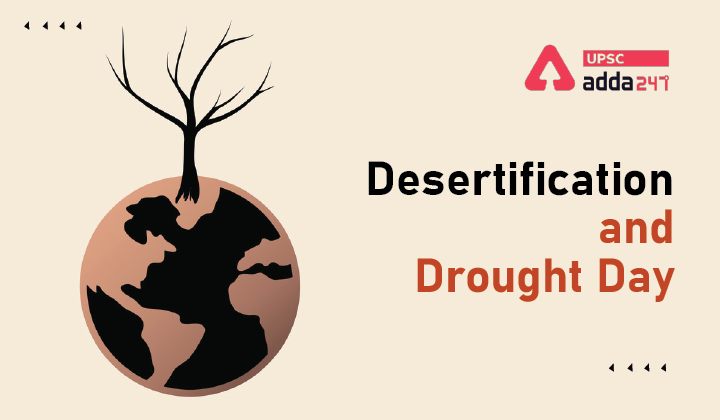Table of Contents
Desertification and Drought Day- Relevance for UPSC Exam
- GS Paper 3: Environment- Conservation, environmental pollution and degradation.
Desertification and Drought Day in News
- Ministry of Environment, Forest and Climate Change (MoEF&CC) organized Desertification and Drought Day, under the chairmanship of Shri Bhupender Yadav, Union Minister of Environment, Forest and Climate Change.
Key Facts about Desertification and Drought Day
- About: Desertification and Drought Day is organized with an aim to generate large scale awareness for understanding the key role of land in all environmental and economic concerns facing India and the world.
- Organizing Ministry: Desertification and Drought Day is organized each year by the Union Environment Ministry.
- Significance: Desertification and Drought Day encourages individuals and groups to take initiatives that can keep the land healthy and productive.
- Key Events: The event showcased presentations on various aspects of desertification such as-
- Initiative taken on restoration of Banni grassland,
- Experience on Indian eco-restoration of deserts,
- Forestry certification &
- Achieving land degradation neutrality.
- Forest Stewardship Council’s Forest Stewardship Standard for India: was released by the Union Minister.
- This India-specific, voluntary forest management standard will give impetus to third-party auditing of forest owners for various principles, criteria and indicators.
- Forest certification is an important tool to combat desertification and promote forest sustainability.
- FSC forest certification will support Atmanirbhar Bharat goals and country’s efforts towards meeting our international commitments under SDGs, CBD, UNCCD, UNFCCC and Bonn Challenge.
United Nations Convention to Combat Desertification (UNCCD)- COP15 of UNCCD
India’s Efforts Against Desertification
- India hosted the 14th session of Conference of parties (COP 14) of United Nations Convention to Combat Desertification (UNCCD) in September 2019 and recommendations of the Inter-Governmental working group report on Drought in COP-15.
- During India’s presidency of UNFCC, India has made significant progress in its commitment to restore 26 million hectares of degraded land by 2030.
- Many major initiatives have been launched and existing programmes strengthened in meeting India’s Land Degradation Neutrality targets.
- This would focus on sustainable and optimum utilisation of land resources.
- Soil Health Card (SHC): India has enhanced monitoring the health of its soils through the Soil Health Card Programme implemented throughout the country.
- Over 229 million Soil Health Cards have been issued to farmers between 2015 and 2019.
- Soil Health Card (SHC) program has led to a decline of 8-10% in the use of chemical fertilizers and also raised productivity by 5-6%.
- Following the global call for the submission of nominations for World Restoration Flagships, the Government of India endorsed six restoration flagships that target the restoration of 12.5 million hectares of degraded lands.
- Government of India has adopted collective approach for making progress towards achieving the national commitments related to land restoration.
About UNCCD
- Background: The United Nations Convention to Combat Desertification (UNCCD), was established in 1994.
- About: UNCCD is the sole legally binding international agreement linking environment and development to sustainable land management.
- Scope: UNCCD Convention addresses specifically the arid, semi-arid and dry sub-humid areas, known as the drylands.
- New UNCCD 2018-2030 Strategic Framework: It is the most comprehensive global commitment to achieve Land Degradation Neutrality (LDN) in order to-
- Restore the productivity of vast expanses of degraded land,
- Improve the livelihoods of more than 1.3 billion people, and
- Reduce the impacts of drought on vulnerable populations to build.
United Nations Convention to Combat Desertification





 TSPSC Group 1 Question Paper 2024, Downl...
TSPSC Group 1 Question Paper 2024, Downl...
 TSPSC Group 1 Answer key 2024 Out, Downl...
TSPSC Group 1 Answer key 2024 Out, Downl...
 UPSC Prelims 2024 Question Paper, Downlo...
UPSC Prelims 2024 Question Paper, Downlo...





